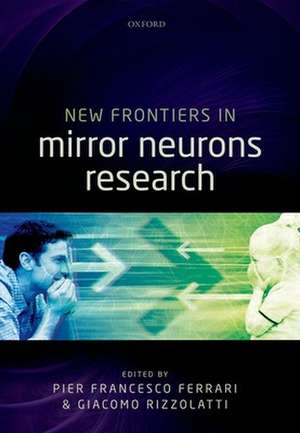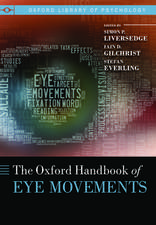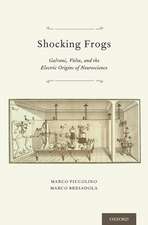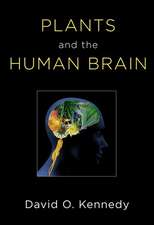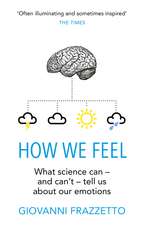New Frontiers in Mirror Neurons Research
Editat de Pier Francesco Ferrari, Giacomo Rizzolattien Limba Engleză Hardback – 8 oct 2015
Preț: 599.12 lei
Preț vechi: 853.93 lei
-30% Nou
Puncte Express: 899
Preț estimativ în valută:
114.65€ • 122.59$ • 95.59£
114.65€ • 122.59$ • 95.59£
Carte disponibilă
Livrare economică 17-22 martie
Preluare comenzi: 021 569.72.76
Specificații
ISBN-13: 9780199686155
ISBN-10: 0199686157
Pagini: 432
Dimensiuni: 186 x 248 x 23 mm
Greutate: 0.89 kg
Editura: OUP OXFORD
Colecția OUP Oxford
Locul publicării:Oxford, United Kingdom
ISBN-10: 0199686157
Pagini: 432
Dimensiuni: 186 x 248 x 23 mm
Greutate: 0.89 kg
Editura: OUP OXFORD
Colecția OUP Oxford
Locul publicării:Oxford, United Kingdom
Recenzii
This rare, one-of-a-kind book provides an excellent, integrated package of information about the mirror mechanism of the human brain, particularly mirror neurons, which control not only physical movements, but also perform numerous sophisticated acts of cognition.
...suitable for both specialist neuroscientists and others who want to learn detailed facts about the mirror mechanisms
This area of research is both extremely interesting with deep implications for neuroscience, and at the same time, it generates intense debate and controversy. [New Frontiers in Mirror Neurons Research] aims to discuss this subject matter in great detail and provide a varietyof opinions and viewpoints. It does so with remarkable success.
...suitable for both specialist neuroscientists and others who want to learn detailed facts about the mirror mechanisms
This area of research is both extremely interesting with deep implications for neuroscience, and at the same time, it generates intense debate and controversy. [New Frontiers in Mirror Neurons Research] aims to discuss this subject matter in great detail and provide a varietyof opinions and viewpoints. It does so with remarkable success.
Notă biografică
Pierfrancesco Ferrari is Associate Professor at the University of Parma, Italy, and Adjunct Professor at the University of Maryland, USA. Ferrari's current research focuses on the functional role and development of parietal and premotor cortical functions in relation to social cognitive processes in human and nonhuman primates. From 2007 to 2008, Ferrari served as Adjunct Scientist at the NIH, Bethesda, USA, conducting research on cortical development in relation to cognitive functions in macaque monkeys. Together with Giacomo Rizzolatti he is Director of the International School of Neurosciences "Sir John Eccles ", at the Ettore Majorana Centre in Erice, Italy.Giacomo Rizzolatti has been President of the European Brain Behavior Society and Italian Society for Neuroscience. He is the Senior Scientist of the research team that discovered mirror neurons. His main research focus has been the role of the motor cortex in higher cognitive functions. He is member of Accademia dei Lincei, Académie des Sciences and the National Academy of Sciences. He is the recipient of several prizes: "Golgi Prize for Physiology", "George Miller Award", "Grawemeyer Prize ", Price of Asturias Prize for Science and Technology " Prix J.L. Signoret in Neuropsychologie " from the IPSEN Fondation, and the "Brain Prize from Lundbeck Foundation ".
